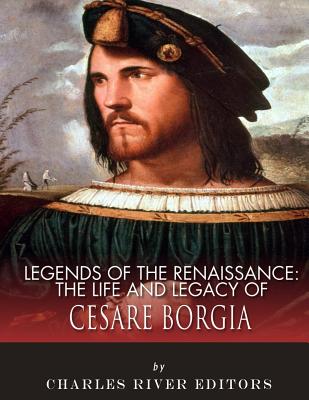Legends of the Renaissance: The Life and Legacy of Cesare Borgia

Legends of the Renaissance: The Life and Legacy of Cesare Borgia
*Examines the legends and rumors surrounding Cesare's life in an attempt to separate fact from fiction.
*Includes pictures depicting Cesare and other important people in his life.
*Includes a Bibliography for further reading.
"Cesare Borgia was considered cruel; nonetheless, that cruelty united Romagna and brought it peace and stability. On careful reflection, he was more merciful than the Florentines, who, in order to avoid being seen as cruel, allowed Pistoia to be destroyed. Therefore a prince, so long as he keeps his subjects united and loyal, ought not to mind the reproach of cruelty; because with a few examples he will be more merciful than those who, through too much mercy, allow disorders to arise, from which follow murders or robberies." - Machiavelli, The Prince
The Renaissance revolutionized art, philosophy, religion, sciences and math, with individuals like Galileo, Leonardo, Michelangelo, Raphael, Dante, and Petrarch bridging the past and modern society. But it also had its fair share of notorious villains and legendary characters, such as the Borgias. In Charles River Editors' Legends of the Renaissance, readers can get caught up to speed on the lives of the most important men and women of the Renaissance in the time it takes to finish a commute, while learning interesting facts long forgotten or never known.
In one of the most famous political treatises in history, Niccolo Machiavelli famously advises those who hold power that it is better to be feared than loved. Though he uses Cesare as a cautionary tale about acquiring power through the good-will and powers of another person (his father, Pope Alexander VI), it is clear in The Prince that Machiavelli holds out Cesare as a skillful, effective ruler and administrator. In many ways, Cesare has been characterized as the "prince" Machiavelli tells his readers to be. As one translator of The Prince put it, Cesare is "cited as a type of the man who rises on the fortune of others, and falls with them; who takes every course that might be expected from a prudent man but the course which will save him; who is prepared for all eventualities but the one which happens; and who, when all his abilities fail to carry him through, exclaims that it was not his fault, but an extraordinary and unforeseen fatality."
500 years after Cesare's death, he and his family have come to be associated more with crime, specif
PRP: 63.09 Lei
Acesta este Prețul Recomandat de Producător. Prețul de vânzare al produsului este afișat mai jos.
50.47Lei
50.47Lei
63.09 LeiLivrare in 2-4 saptamani
Descrierea produsului
*Examines the legends and rumors surrounding Cesare's life in an attempt to separate fact from fiction.
*Includes pictures depicting Cesare and other important people in his life.
*Includes a Bibliography for further reading.
"Cesare Borgia was considered cruel; nonetheless, that cruelty united Romagna and brought it peace and stability. On careful reflection, he was more merciful than the Florentines, who, in order to avoid being seen as cruel, allowed Pistoia to be destroyed. Therefore a prince, so long as he keeps his subjects united and loyal, ought not to mind the reproach of cruelty; because with a few examples he will be more merciful than those who, through too much mercy, allow disorders to arise, from which follow murders or robberies." - Machiavelli, The Prince
The Renaissance revolutionized art, philosophy, religion, sciences and math, with individuals like Galileo, Leonardo, Michelangelo, Raphael, Dante, and Petrarch bridging the past and modern society. But it also had its fair share of notorious villains and legendary characters, such as the Borgias. In Charles River Editors' Legends of the Renaissance, readers can get caught up to speed on the lives of the most important men and women of the Renaissance in the time it takes to finish a commute, while learning interesting facts long forgotten or never known.
In one of the most famous political treatises in history, Niccolo Machiavelli famously advises those who hold power that it is better to be feared than loved. Though he uses Cesare as a cautionary tale about acquiring power through the good-will and powers of another person (his father, Pope Alexander VI), it is clear in The Prince that Machiavelli holds out Cesare as a skillful, effective ruler and administrator. In many ways, Cesare has been characterized as the "prince" Machiavelli tells his readers to be. As one translator of The Prince put it, Cesare is "cited as a type of the man who rises on the fortune of others, and falls with them; who takes every course that might be expected from a prudent man but the course which will save him; who is prepared for all eventualities but the one which happens; and who, when all his abilities fail to carry him through, exclaims that it was not his fault, but an extraordinary and unforeseen fatality."
500 years after Cesare's death, he and his family have come to be associated more with crime, specif
Detaliile produsului









